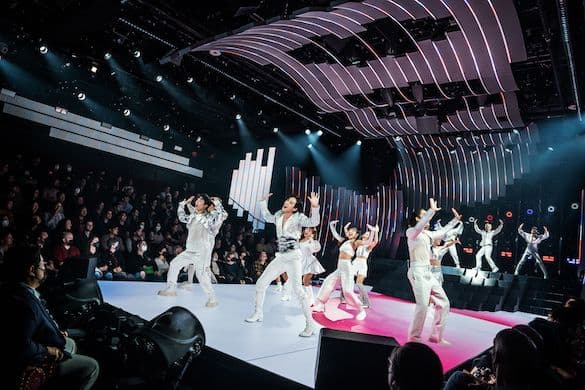On Broadway, ‘KPOP’ Takes Us Inside a Fame Machine
The show transcends buoyant entertainment with its focus on the tensions underlying the exhilarating, dazzlingly precise song-and-dance routines on display here.

The title of the exuberant musical that just opened at Broadway’s Circle in the Square, “KPOP,” refers to a movement that took root in South Korea more than 30 years ago and has since become a global phenomenon. The music itself is essentially bubble-gum pop on steroids, layering Western pop textures — rock, hip-hop, electronic dance music — into high-energy ear candy, served by today’s leading acts with lyrics in Korean and English, among other languages.
The culture surrounding K-pop is less focused on individual expression, though to some extent more honest, than the one that produced the likes of Britney Spears or any number of American and British boy bands that have sprouted in recent decades. Whereas such artists can see their aspirations to creative and professional autonomy squashed as quickly as they’re celebrated — as Ms. Spears’s public ordeal showed dramatically — K-pop aspirants often enter training camps at very young ages, where they’re taught the primacy of discipline and following orders.
This doesn’t mean that Korean boys and girls are fundamentally less inclined to question or dream than their peers in this country, and what makes “KPOP” transcend buoyant entertainment is its focus on the tensions underlying the exhilarating, dazzlingly precise song-and-dance routines on display here, courtesy of composer/lyricists Helen Park and Max Vernon and choreographer Jennifer Weber.
Jason Kim’s snappy libretto, which has been revised substantially since the show’s acclaimed off-Broadway staging in 2017, introduces us to a female record company executive named Ruby — the same name assigned to the wife and partner of a Korean music biz mogul in the earlier staging. The character is now apparently single, and runs her own label, RBY Entertainment, with an all-consuming determination stemming from her own early failure as a fledgling K-pop idol.
We meet Ruby as she is preparing to shoot a concert showcasing her acts to American audiences. She’s enlisted a director from our shores, Harry, a not-so-slick peacock who yearns to make the rigidly schooled young artists more “engaging” and “accessible,” as he puts it — and spies an opportunity when MwE, the diva whom Ruby has fastidiously mentored since the star was 9 years old, abruptly runs out of a rehearsal in mid-performance.
Through Peter Nigrini’s projection design, we follow MwE backstage, where Harry’s cameraman surreptitiously films her interaction with Ruby. “You and me, we’ve built something,” the exec, whose repressed panic is made palpable by an elegant Jully Lee, pleads. “A machine. An extraordinary machine.” To which MwE — a cauldron of charisma, vulnerability, and mettle, all captured with delectable glamor by the Korean pop singer and actress Luna — responds, “Something broke tonight.”
Flashback scenes help explain this machine’s fragility, showing us how MwE was pressured and humiliated (and abandoned by her mother to boot) while being groomed for fame. It emerges, not surprisingly, that Harry’s interest in MwE and Ruby’s other artists — a boy band called F8 and the girl group RTMIS — is even less driven by empathy; Ruby, at least, has walked in their sparkly shoes herself, and Ms. Lee’s nuanced performance humanizes her considerably.
Ultimately, RBY’s artists must find affirmation and self-respect in spite of the elders ostensibly guiding them, and under Teddy Bergman’s brisk but sensitive direction several of the lavishly gifted young singers and dancers playing these characters get to flesh them out. “Dear Evan Hansen” alumnus Zachary Noah Piser lends delicate pathos and a gleaming tenor to the role of Brad, an Asian-American recruit to F8 who flees discrimination in his native Connecticut only to face resentment among his new bandmates, while the rangy Kevin Woo makes Brad’s leading nemesis, Jun Hyuk, both intimidating and sympathetic.
RTMIS’s members prove just as formidable, particularly in standing up to Harry (a droll Aubie Merrylees) when he tries to get them to dish about MwE behind Ruby’s back. Riya, played with unimpeachable sass by Min, tells the filmmaker, “We are NOT melodramatic. Maybe you’re just repressed,” then demands that the cameraman delete her speculation. Later, two of her colleagues debate whether to always “follow the GPS” dictated by Ruby. “It’s exhausting,” one says, while the other admits, “I find it comforting.”
The “KPOP” design team ensures that the show looks scrumptious even as such conundrums are being tackled. Clint Ramos and Sophia Choi’s costumes and Jiyoun Chang’s lighting burst with bright color — though as with Ms. Park and Mx. Vernon’s score, there are occasionally more subdued touches that remind us of the spirits lurking behind the star-maker machinery. Whatever your take on the music, you’ll likely leave this show rooting for the performers.

